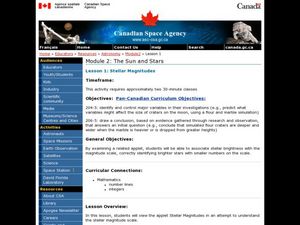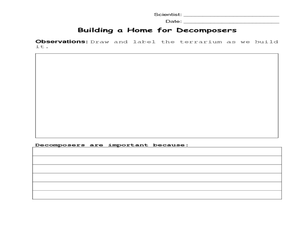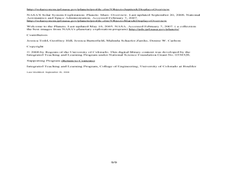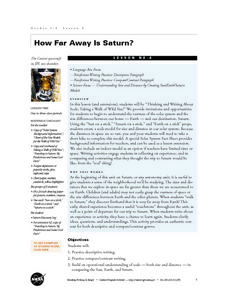Curated OER
Making a Crater
Students examine the characteristics of craters. In this crater lesson, students discover how meteors form craters on planets and moons as they make their own craters and respond to observational questions regarding the...
Curated OER
Rock Around the World
Students take pictures and write a paragraph about a rock they have found. For this rock lesson plan, students also send their information to the Mars Space Flight Facility.
Curated OER
Stellar Magnitudes
Learners analyze the stellar magnitude scale. In this stellar magnitude lesson, students examine the stellar magnitude scale. Learners predict the Sun's magnitude from various planets.
Curated OER
De-composers - Terrarium
Learners explore the environment by building a mock ecosystem. In this rainforest analysis lesson plan, students define many environmental and rainforest related vocabulary terms and discuss the current status of our planet's...
Curated OER
Solar System: Let's Take a Trip
Third graders consider outer space. For this introductory solar system lesson, 3rd graders complete a KWL chart and listen to the story The Magic School Bus: Lost in the Solar System, by Joanna Cole & Bruce Degen. They will...
Curated OER
Solar Relatives
Students examine the solar system by creating a model representation. In this space science lesson, students research our solar system and the distances between planets. Students create a model solar system in their gymnasium...
Curated OER
Mars and Jupiter
Students learn about how engineers help us to know about Mars and Jupiter. In this Mars and Jupiter lesson, students are introduced to the telescope, deep space antennas, spacecraft, and planetary rovers that engineers designed to help...
Curated OER
How Big Are Earth, Sun, and Moon?
Third graders draw what they believe is in space on a dry erase board. In groups, they are given a beaker half filled with water and they add a teaspoon of oil, observing the different layers that form. To end the instructional...
Curated OER
An Invisible Pull
Fifth graders explain why objects thrown upward falls back to Earth. In this earth science lesson plan, 5th graders identify the forces acting on objects. They discuss why planets do not float in space.
Space Awareness
The Intertropical Convergence Zone
Young scientists know it is hotter along the equator, but why is it also rainier? Through the process of completing two experiments and a worksheet, scholars discover the answer is the intertropical convergence zone. First, they...
Curated OER
How Far Away Is Saturn?
Students work together to create a scale model of the solar system. They write a descriptive paper and a paper comparing and contrasting the Earth to Saturn. They discuss their writings with the class.
Curated OER
Earth to Saturn, Earth to Saturn!
Students compare and contrast the characteristics of Earth and Saturn. They practice writing analogies using those characteristics. They complete a worksheet to end the lesson.
Curated OER
The Weather Classroom: Atmosphere
Students explore the planets and their atmospheres online. They write the story of "Goldilocks and the Nine Planets" to explain how each planet's atmosphere differs from Earth's. They design a viable life form.
Curated OER
Mission Planning: Geography
Students investigate the use of latitude and longitude to locate specific locations on Earth and evaluate that location as a potential landing site for researchers, terrestrial or alien space missions.
Curated OER
Extra Terrestial Excursions
Fourth graders determine how long it would take to fly to each of the planets in the solar system. They do two calculations: one, if they were using conventional jet, the other if they were using the fastest spacecraft possible.
Curated OER
Destination Mars!
Fifth graders view Mysteries of Earth & Mars Video on DVD and record thoughts in their online journal. They record data in a spreadsheet about each planet then form a theory of the best time to launch a space craft from Earth to land...
Curated OER
Why is the Average Temperature Greater on Venus than on Mercury?
Middle schoolers examine the reasons why the temperature is higher on Venus than on Mercury. In groups, they analzye both planet's atmospheres and determine the rate of global warming on each. They use the internet to research the...
Curated OER
Solving Saturn's Mysteries
Middle schoolers study the Cassini spacecraft and its travel to Saturn. They discover the results of the space mission and examine images of Saturn that Cassini sent back.
Curated OER
Global Warming – More or Less
Eighth graders identify the factors that contribute to global warming. In this earth science activity, 8th graders evaluate the impact of global warming on the planet. They discuss their views within the group.
Curated OER
Best of the Solar System
Students visit a site which provides images to be analyzed. Notes are taken and planets are named based on observed features and observations. Using peer review, they try to determine the identity of the planets. They are free to browse...
Curated OER
Creating NEW Human Rights
Students decide on what human rights should exist at a new hypothetical planet after watching clips of three videos. They complete journal entries which tell about factors that influence new human rights.
Curated OER
Observing Mars in the Night Sky
Students compare and contrast the orbits of Earth and Mars, locate the planet Mars, and diagram its retrograde motion.
Curated OER
Sea Secrets
Students study the following: For centuries, people have been challenged by the mysteries that lie beneath the blue depths of our ocean planet. Very little was known about the ocean until late in the nineteenth century, although nearly...
Curated OER
Nature of Meteor Showers
Ninth graders describe, in general terms, the distribution of matter in space and
identify evidence for, and describe characteristics of, bodies that make up the solar system. They then investigate predictions about the motion,...
Other popular searches
- Planets Outer Space
- Science Space and Planets
- Outer Space Outer Planets
- Poetry Space and Planets
- Planets and Space
- Space Planets Scale
- Space and Planets Practical























